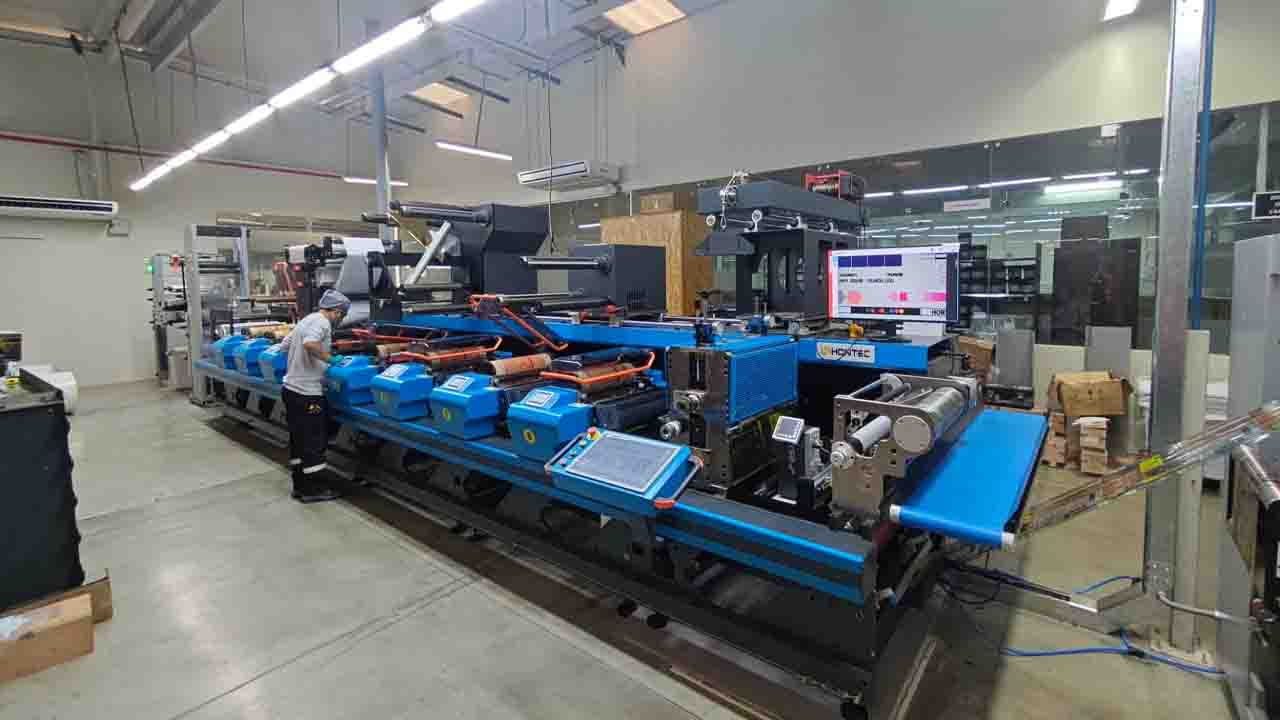What Fernando did next
Fernando Aravena, owner of Etiprak before its takeover by York Label, has founded a label converter in Peru in partnership with Union Plast. It's the latest step in his plan for a regional network of companies. James Quirk reports
Fernando Aravena looks on approvingly as his young charges take L&L on a tour of Primitiva Label’s small but pristine space at one end of flexible packaging converter Union Plast’s factory in the industrial San Luis suburb of Lima, Peru.
Primitiva, founded a year ago and producing self-adhesive labels since the beginning of 2010, is a partnership between Aravena and Tarek Kahhat, managing director of Union Plast, and the latter’s three brothers. Aravena owns 50 percent of the operation, and spends around one week in four with the company. He introduces L&L to sales coordinator Alexandra de la Torre and operations manager Manuel Ganoza, then steps back to observe their enthusiastic explanations of Primitiva’s business.
The company is Aravena’s brainchild and his pride in the venture is evident. A clause in the buy-out of Etiprak by York Label prevents him from owning a label printing operation in Chile until 2011; however, Aravena says that establishing a company in Peru was always an ambition, even while he was still with Etiprak.
‘The Peruvian export market has grown a huge amount in recent years,’ he says. ‘There are low production costs and a wider variety of industries compared to neighboring countries. There is great potential both within the local market and also for export, particularly in the pharmaceutical and beverage markets.’
Regional network
As well as the taking advantage of the fast-growing Peruvian economy, the venture is reflective of Aravena’s wider ambition: to create a network of label converters across Latin America, each with complementary technology.
The first step took place eight years ago, when Aravena partnered with Argentine converter Adhepel to create a new company, Tag Wine, to cater to the wine label market in Mendoza, Argentina’s largest wine-producing region, close to the Chilean border. Operations and partnerships in other markets are also on the horizon, but cannot yet be divulged.
‘I want to create a regional network of companies,’ he says. ‘We will implement the same standards and collaborate on jobs. The technology is the same, too: ‘when we installed a Nilpeter press and Rotoflex finishing machine at Primitiva in Lima, the same machines were also purchased for Tag Wine in Mendoza.’
Aravena says that Primitiva has already benefited from Tag Wine’s expertise in the wine label market, an area that Primitiva caters to along with the food, beverage and industrial sectors. Dedicated exclusively to self-adhesive labels, all of Primitiva’s production is currently exported, to countries such as the United States, Canada, Mexico and the UK.
Partnership
Primitiva’s facility is situated within Union Plast’s factory, and houses an 8-color Nilpeter FB 3300 flexo press with in-line lamination and cold-foil. Installed in November 2009, it is the first and only servo-driven flexo press in Peru, says Aravena. The machine runs paper, polypropylene and polyethylene materials imported from the US, Colombia, Brazil and Argentina.
A Rotoflex inspection rewinder handles finishing. Aside from the machinery, Primitiva’s area contains a small sales office and an ink mixing area. Screen technology will be integrated into the Nilpeter FB 3300 press in the near future, and Aravena says that more equipment is due to be installed next year. The set-up within Union Plast is flexible enough to be expanded easily.
‘We are starting small,’ he says, ‘but everything is being run at a very high level in terms of quality control and standards.’ Primitiva’s press operator was trained at Etiprak during Aravena’s time at the company, when the Chilean converter was often used as a regional training center by Nilpeter.
Union Plast and Primitiva complement each other well, both in terms of the personalities of Tarek Kahhat and Fernando Aravena, and with regards to the companies’ products and markets. Union Plast produces flexible packaging and wrap-around labels for the food, beverage and household goods markets, with 85 percent of its products serving the Peruvian market and the rest exported to Chile, Ecuador, Argentina and Brazil.
‘The products are complementary and this helps the synergy between Union Plast and Primitiva,’ says Kahhat. ‘It has been a privilege to partner with Fernando Aravena on this project.’
Union Plast’s factory houses four sheetfed offset presses, two 8-color, a 6-color and a 4-color, and a number of extrusion machines. The company produces 350 tons per month of flexible packaging, bags, sleeves and wrap-around labels.
Union Plast is an importer of biodegradable plastic materials from UK company Symphony, which adds its d2w additive into the plastic at the extrusion stage, resulting in a finished product that will degrade and disappear in a short timescale, leaving no fragments, methane or harmful residues.
In a further environmental initiative, Union Plast recycles its material waste by palletizing it on-site and selling it on. As well as financially prudent and environmentally beneficial, Kahhat reveals that the system prevents the risk of counterfeiting as the company’s products cannot be found in the street and copied, a common problem in Peru.
Kahhat and his three brothers equally own Union Plast and also Textil Jordana, a nearby textile company. The San Luis area is a hub of textile production, one of Peru’s largest export markets.
Pictured l-r: Tarek Kahhat, managing director of Union Plast; Fernando Aravena, president of Primitiva Label
This article was published in L&L issue 4, 2010
Stay up to date
Subscribe to the free Label News newsletter and receive the latest content every week. We'll never share your email address.


